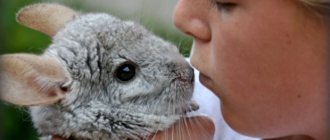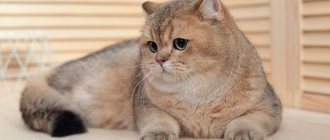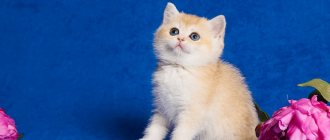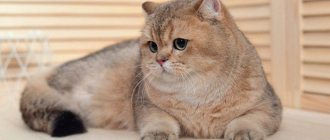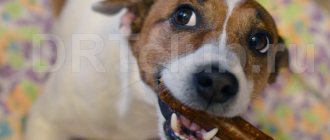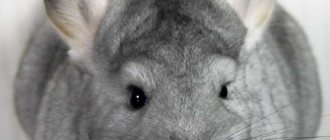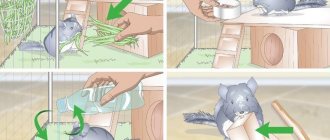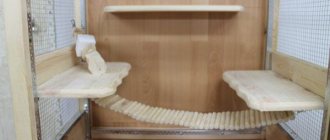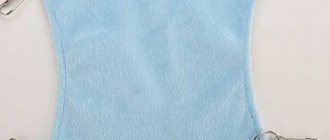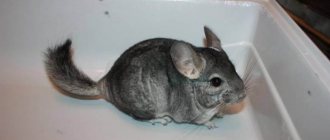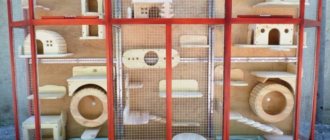Home » Rodents » Chinchillas » What to feed a chinchilla at home
The future owner of this exotic animal will have to figure out in detail what to feed the chinchilla at home. It is important to understand what foods can be offered to this animal, what is prohibited, and what foods are welcome in its diet.
Rules for feeding chinchillas at home
The main rule that the owner of a furry rodent must remember is that food from the human table is not suitable for the animal! Chinchillas' diet consists of plant foods with the obligatory presence of fiber - coarse hay. In addition to hay, the animals are given tree branches: apple, pear, willow, linden, mulberry, rowan, aspen, hazelnut, elm. The rodent not only eats twigs for saturation, but also grinds its teeth on them.
When creating a menu for pets, you need to monitor the freshness of the products and their quality:
- the grain and hay should be free of mold, dead pests and rodent droppings;
- Hay and twig food for chinchillas can only be collected away from roads and industrial enterprises.
Properly feed rodents - once a day, giving out the entire amount of grain products (about 1 tablespoon) and treats at once. Hay is given ad libitum, making sure that it is always in the cage.
There must be a mineral stone freely available.
Main menu
The chinchilla diet includes hay and twig food, grain mixture, vegetables, fruits, and berries. The animals are given greens and nuts as a healthy and tasty supplement.
To enrich the menu with vitamins and microelements, pets are given complex water-soluble vitamins: Beafar, Vita-Sol, Canina Petvital. The drugs are added to food or water according to the instructions.
Rough and juicy food
Rough feed includes hay and tree branches. This is the basis of the diet of a rodent, whose digestive tract is designed to digest food rich in fiber. Herbal granules contained in ready-made food for chinchillas cannot fully satisfy the animal's need for fiber.
Juicy food (vegetables, fruits, fresh herbs) are sources of vitamins and microelements for the animal’s body. You can feed your chinchilla the following foods:
- pumpkin, carrots, zucchini, cucumbers, root parsley, celery;
- apples, pears, melon, watermelon, seedless grapes, plums, bananas;
- berries of rowan, hawthorn, viburnum, rose hips, barberry;
- dried meadow grass, tops of legume garden plants, leaves of dandelion, honey, nettle and quinoa.
The amount of succulent food in a chinchilla's diet should be limited. The pet is allowed to give a piece no larger than a walnut per day. Large amounts of juicy foods can lead to diarrhea and bloating.
Combined feeds
Purchasing ready-made specialized mixtures greatly simplifies the care of feeding animals. The compound feed recipe is developed by scientists specifically for different groups of animals - young animals, pregnant and lactating females, adults. The composition meets the needs of the chinchilla and is balanced in the amount of proteins and fats.
In addition to ready-made food, the pet must be provided with hay. Occasionally you can pamper the animal with a treat.
At home, chinchillas happily eat food from the following brands: Little On, Waka, Vitacraft, Versel-Laga. Preference should be given to granulated food, from which the pet will not be able to choose the most delicious pieces, ignoring the rest of the food.
Vitacraft
Little He
Waka
Vercelles-Laga
Hay
For rodents (chinchillas, rabbits, guinea pigs), you can buy hay at a pet store. But you can prepare dry grass yourself at the rate of 120–180 g per head per day.
For drying, grasses are cut when they are just about to bloom - at this time the content of nutrients and vitamins is highest. It is better to dry in the shade so that the hay remains green and fragrant. Various plants are suitable for harvesting:
- The chinchilla readily eats hay from meadow grasses (cocktail grass, foxtail grass, wheatgrass, fescue, bromegrass, bluegrass, timothy grass).
- It’s good if the hay contains chamomile, tansy, wormwood, and plantain. These medicinal herbs are useful for the animal’s digestion.
- Nutritious and tender bean hay from clover, alfalfa, sainfoin.
- Dried tops of carrots and peas, leaves of corn, nettle, and mint will be an excellent addition to hay.
You should avoid including nightshade, horsetail, fern, henbane, celandine, datura, cornflower, crow's eye, and sweet clover in the food.
Hay should be stored in linen bags in a dry and dark place.
Hard food
In the wild, chinchillas eat seeds of wild cereals. At home, animals can be fed with a mixture of regular grains:
- Whole oats are an easily digestible, non-obesifying food. The grain can be replaced with oatmeal.
- Corn is nutritious and rich in protein, but in large quantities it can cause bloating.
- Wheat is a nourishing, balanced product.
- Barley is given only in crushed or flattened form.
- Sunflower seeds are given raw; they are rich in fatty acids necessary for rodents.
- Hemp and flax seeds are healthy products for chinchilla digestion.
In percentage terms, the basis of the grain mixture for a rodent is oats (up to 70%), wheat and corn are given in equal shares, flax and sunflower seeds - no more than 5% of the total mass of the mixture.
It is useful to give part of the grain in sprouted form, the size of the sprouts is up to 10–15 mm.
Treats
To pamper your pet, you can give your chinchilla:
- nuts (walnuts, cashews, peanuts, almonds);
- dried fruits (raisins, dried apricots, rose hips, apples and pears);
- pumpkin seeds;
- fresh berries (raspberries, currants, gooseberries, strawberries, viburnum, blueberries).
The main thing is to remember that a treat cannot be a substitute for a full-fledged food . Chinchillas love sweets and can beg for pieces of dried fruit or berries endlessly, rejecting regular food. This can lead to digestive problems. The approximate norm for giving treats to an adult animal is 1 berry, 1 nut or a piece of dried fruit the size of a hazelnut per day.
Natural treats
The main treat for chinchillas is dried apples. They contain fiber, which promotes proper digestion. Remove toxic waste products and improve overall metabolism in the animal’s body. Like carrots, apples help strengthen fur and the cardiovascular system.
Dried carrots are perfect for constant pampering. It contains vitamins A, B, C, E, a large amount of iron, potassium, calcium. As you know, this is the main supplier of beneficial carotene to the body. Carrots are a natural teeth cleaner. Since it awakens the appetite, you don’t need to give it a lot at once - a pinch a day is enough. Sweet pepper in the same quantity is an excellent vitamin supplement that strengthens teeth, gums and immunity.
Raisins are given to strengthen the heart, as a cure for anemia and weakness. Chinchillas love it very much because raisins contain a lot of sugar. But you should not give more than 1 berry per week. Raspberries can be given fresh or dried, 2-3 berries per week (like hawthorn). It is rich in organic acids and salts of iron, potassium, and copper. Dried hawthorn is more of a medicine than a tasty treat. It helps to calm down, cope with stress, and is also indispensable for intestinal upset. The same amount of pumpkin seeds can be given to improve digestion, skin, and hair follicles.
Chokeberry is also rich in amino acids and rare vitamin P. Together with sweet pepper, they normalize the composition of vitamins and microelements in the chinchilla’s body. In addition to the listed delicacies, you can give nettles, oats, almonds, linden flowers, and fresh (not fried!) sunflower seeds. Chinchillas also love to sip green tea from time to time. It is rich in vitamins B1, B2, K, C, BB, and optimizes the nervous system. Green tea is a powerful antioxidant; it is better not to give more than a teaspoon per week.
Foods that can be given in limited quantities
The list of products that chinchillas are fed at home includes some that can be given to the animals in small quantities.
- Nuts, sunflower seeds, peas, lentils, corn are highly nutritious food, rich in protein and fat . If the rodent is overfed with these foods, it becomes fat and its digestion may be impaired.
- Juicy greens (lettuce, dandelion) and vegetables (cucumbers, zucchini) are loved by animals, but these foods weaken them. Each day, one animal is given half a leaf of lettuce or one slice of cucumber 3–4 mm thick.
- Sweet fruits and berries are a favorite food for chinchillas, but in large quantities they can lead to metabolic failure.
- branches of plants such as raspberry, willow, oak, alder and birch no more than once a week.
Each product new to the animal is given in the smallest dose, observing the pet’s behavior. If there is no deterioration in health within 24 hours after the introduction of the food, the product can be offered in an increased volume.
Important Principles
The basis of any food is its good quality. That is, he cannot be
- moldy,
- musty,
- stale,
- rancid.
Do not harvest green fodder in contaminated areas:
- on the sides of the roads,
- in industrial areas,
- on fields that have undergone chemical treatment against pests.
You can feed only washed and dried vegetables, fruits and herbs. Green leaves should be dried. Do not feed wet greens, only dry ones.
https://youtube.com/watch?v=xZ7ibGkn6w8
You need to gradually get used to new, especially green food. After each increase in serving size, monitor the condition of your pets.
Follow the feeding schedule.
- Daily.
- One-time.
- Regular.
- Late evening.
Evening feeding is explained by the fact that these animals are active at night. This is written in detail in the article (Farm 27, “Chinchilla at home”).
In the morning you can feed only when everything from yesterday has been eaten. The main evening food should only be poured into an empty and clean feeder.
The chinchilla's body is designed for unfavorable ascetic living conditions. They have a very long intestine, designed to extract maximum benefit from the meager food that they still have to run for. This is what happens in nature. Therefore, by creating conditions that are close to natural, you will save your pet from premature death. And for this you need to pamper him less, feeding him all sorts of goodies.
Products prohibited for rodents
When monitoring a chinchilla's diet, it is important to remember that the pet is forced to eat what a person offers it. It is not always the case that an animal, relying on instinct, will refuse harmful food, as it would do in the wild.
List of products that are deadly and harmful to animal health:
- meat and dairy products (only nursing females can be given tea with milk instead of water);
- any mushrooms;
- raw and boiled eggs;
- bread, pasta;
- potatoes in any form;
- roasted nuts, seeds;
- thermally processed food, sweets.
You should not give your pet shoots of the following trees: spruce, pine, lemon, apricot, cherry, plum, lilac, bird cherry, maple, elderberry.
Taking into account the peculiarities of the diet and restrictions in the choice of products for chinchillas, novice animal owners are recommended to buy high-quality specialized food, supplementing the menu with good hay.
Contraindications and harm
Among the most common contraindications to the use of seeds, various allergic reactions and inadequate immediate reactions are in first place.
If you suddenly see that after eating seeds, your rabbit has foam at the mouth, it becomes difficult for him to breathe (he coughs, starts sneezing, wheezing, etc.) or massive swelling appears on his body - then know that he seeds are contraindicated.
In general, it is quite difficult to identify general groups of contraindications for all types of seeds. For example, a contraindication to consuming sunflower seeds is animal obesity, while for pumpkin seeds this is, on the contrary, an indication.
Sunflower should also not be eaten by rabbits whose age has passed 5–7 years, who have atherosclerosis or have/had high cholesterol levels.
Pumpkin kernels are not recommended to be given to rabbits that have digestive disorders, have recently suffered acute infectious diseases, or during the period of a full-blown clinical picture of any disease.
Pumpkin seeds should also not be eaten by those furry animals that have problems with the functioning of their senses: hearing, vision and smell, as this can negatively affect them.
Important! If any of the symptoms listed in this section appear, we recommend that you immediately seek help from a professional veterinarian. Among other possible harms from eating seeds, you should also expect the development of: appendicitis, irritable bowel syndrome, diarrhea (roasted sunflower), constipation (pumpkin), vomiting, various changes in the lipid spectrum of the blood, obesity (sunflower), loss of hair and claws, and the appearance of irritation on the skin
